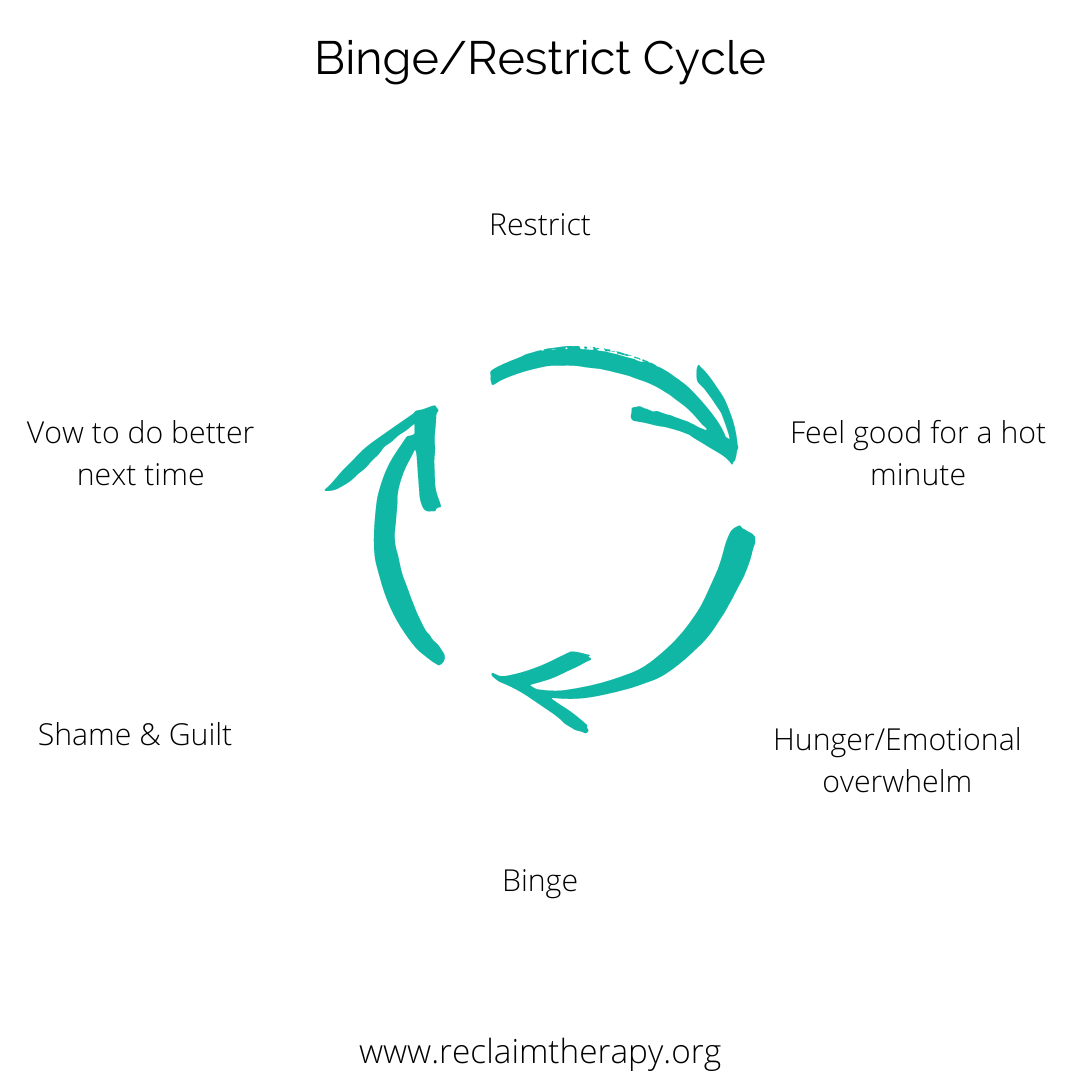Binge Restrict Cycle: Types of Restriction in Binge Eating Recovery
Would you rather listen? Go ahead and click play!
When starting the very hard work of normalizing your relationship with food, being curious about how restriction is playing a role in your eating behaviors is one of the most helpful places to start.
Most people don’t equate restriction with all of the eating disorders, but the truth is that restriction is at the foundation of disordered eating, anorexia, bulimia, binge eating disorder and orthorexia (along with many other things!).
In the Dieter’s Rebellion Group for women struggling with food and body image, we take a hard look at cycles of behavior around food. And, for most people once they get curious about their own cycle, it’s relatively predictable. This cycle is especially common among chronic dieters, who often experience repeated patterns of restriction followed by binge eating behaviors.
Let’s flip things on their head for a moment. Let’s shift the lens of the problem off of bingeing. Let’s get curious about how restriction is contributing to your own cyclical behavior around food and your body. Binge eating behaviors often emerge as a result of restrictive eating patterns, creating a cycle that can be difficult to break.
Restriction can be a sneaky thing. So, let’s consider a few common types of restriction that could be contributing to your relationship with food. As you get curious about your own cycle, pay attention to your eating pattern to better understand how restriction and bingeing may be connected.
Understanding Binge Eating
Binge eating, sometimes referred to as bingeing, involves eating unusually large amounts of food within a discrete period, often much more than most people would eat under similar circumstances. When binge eating occurs, it’s not just about the quantity of food, but also the overwhelming sense of loss of control and the emotional aftermath—feelings of guilt, shame, and sometimes even disgust.
Binge eating disorder (BED) is the most prevalent eating disorder, affecting people of all backgrounds. It’s important to understand that binge eating is not a simple matter of willpower or self-control; it’s a complex behavior rooted in emotional distress, mental health conditions, and sometimes other mental health conditions like depression or anxiety.
The consequences of binge eating disorder can be significant, leading to physical discomfort, weight gain, nutrient deficiencies, and even body dysmorphia. If you find yourself struggling with binge eating or experiencing these feelings after eating large amounts of food in a short period, know that you are not alone and that professional support is available to help you navigate recovery.
The Restrict Cycle
The restrict cycle, often called the binge-restrict cycle, is a common pattern in disordered eating where periods of restrictive eating behaviors are followed by episodes of binge eating. This cycle can start with limiting caloric intake, avoiding certain foods, or engaging in other restrictive eating behaviors. Over time, these restrictions can lead to intense feelings of deprivation and hunger, making it increasingly difficult to maintain control.
Eventually, this deprivation often triggers a binge episode, where eating behaviors feel chaotic and overwhelming. Afterward, feelings of guilt, shame, and emotional distress can set in, leading to more restriction in an attempt to “make up” for the binge—thus perpetuating the cycle. Breaking free from the restrict cycle requires addressing both the physical and emotional aspects of eating disorders, and often involves learning new ways to respond to hunger, emotions, and the urge to restrict.
Types of Restriction
Restriction doesn’t always look like simply eating less. Restrictive eating behaviors can show up in many forms, such as cutting out entire food groups, limiting caloric intake, or engaging in excessive exercise to “compensate” for eating. Sometimes, restriction is driven by diet culture, which promotes the idea that certain foods are “bad” or that thinness equals health.
Eleven out of 14 participants (79%) in a mixed‑methods study reported that food restriction directly led to binge eating episodes (Source).
Emotional distress, body image concerns, and even obsessive thoughts about food can all contribute to restrictive eating patterns.
Over time, these behaviors can lead to nutrient deficiencies, disordered eating, and even other mental health conditions. Recognizing the many faces of restriction is an important step in disorder treatment and in building a healthier relationship with food and your body. If you notice these patterns in your eating behaviors, seeking professional support can help you address the underlying causes and move toward recovery.
Body’s Hunger Cues
Our bodies are equipped with natural hunger cues—signals that tell us when we need nourishment. Feeling physically hungry is a normal and healthy part of eating, but restrictive eating behaviors and the influence of diet culture can make it difficult to trust or even recognize these cues.
When we ignore or override our body’s hunger signals, it can lead to confusion, disordered eating, and a disrupted relationship with food. Learning to listen to and honor your body’s hunger cues is a key part of eating disorder treatment and recovery.
By responding to physical hunger rather than emotional or environmental triggers, you can begin to rebuild trust with your body and develop a healthier relationship with food. Remember, eating when you’re hungry is not only normal—it’s necessary for your well-being.
Strategies for Recovery
Recovering from binge eating disorder and other eating disorders is a journey that involves both physical and emotional healing. Effective strategies for recovery include seeking professional support through therapy or counseling, and working to develop a healthier relationship with food and your body. This might involve practicing mindful or intuitive eating, challenging the negative messages of diet culture, and engaging in self-care activities that support your mental health.
Building a strong support network of friends, family, and loved ones can provide encouragement and accountability along the way. Remember, breaking free from the restrict cycle is possible, and with the right strategies and support, you can move toward a more positive, empowered relationship with food, your body, and your overall well-being.
Restricting/Depriving Food
For most people, this is the most straightforward place to start. Physical deprivation of food will almost always propel us toward food.
Skipping meals, cutting out food groups, dabbling in intermittent fasting, trying the latest dieting trend- we’ve been trained to believe that restriction of the thing we feel we are struggling with will be the answer. The truth is that restriction is what actually continues to drive the chaos.
Our bodies are smart ya’ll.
Really smart.
We’re hardwired to fight starvation (ie restriction). Our bodies simply want to survive. So, they propel us toward food in a big way. Not because they’re wrong or flawed, but because they have our back.
They want to live and thrive.
And, despite what we’ve been taught, the way to do that is to eat.
Freely. Regularly. Adequately.
Being mindful of what is eaten and ensuring a variety of foods are included is important to support recovery and overall well-being.
Restricting Permission
Intuitive Eating is a self-care eating model that lays out principles to restore your relationship with food. It’s a model that informs my work with clients, and over the years, I have found that one of the principles that scares the heck out of most people is giving yourself unconditional permission to eat.
Restricting permission is a sneaky means of restriction. We’ve all witnessed and taken part in guilt-laden comments about food- how much, what, where, and at what pace has been consumed.
Guilt and shame such common and normalized components of people’s relationship with food.
And, they’re a big part of most people’s cyclical relationship with food, often leading to emotional aftermaths like eating feeling disgusted after a binge or episode of overeating.
Giving yourself full permission to eat meals, snacks and honor cravings, not only challenges guilt and shame, but helps us slow the cyclical nature of behaviors around food. Establishing consistent eating habits can also support breaking this cycle and promote a healthier relationship with food.
Restricting Emotions
Ahhh feeling the feelings. Not something we’ve been taught. I’ll admit, throughout grad school I remember trying so hard to understand how in the world to feel feelings. Like, is there a manual for that?! Wasn’t that what I was supposed to be learning 🤨 ?! LOL
Culturally we’re taught to slap on a smile, grin and bear it, don’t be too much, don’t feel too much. That, combined with personal traumas, many folks feel like floating heads. Intellectualizing, reasoning, understanding in a brain way, but not in a body way.
But, here’s the thing.
Our bodies act as filing cabinets for our minds. If it’s happening in the mind, it’s happening somewhere in the body.
Emotions are energy in motion (e-motion) in our bodies. And when we deny that energy, that information, it will only be so long until it floods us. And we’re left scrambling, trying to figure out how to cope with it, or for many people struggling with their relationship with food, continue to numb and disconnect from it (enter restriction/deprivation).
If you identify as someone who emotionally eats, you know what I mean. You can shove the feelings down to a certain point. Until something or someone pushes you over the edge and you feel things in a big way. This is often when binging or binges can occur, where eating binges happen as a way to cope with overwhelming feels, even if you are not feeling physically hungry eating.
And, there we are. Thrust back in the cycle of eating behaviors. Eating episodes or eating binges, including binge eating at night, are often marked by feeling uncomfortably full and a mix of emotional and physical feels, highlighting the disconnect between physical hunger and emotional eating.
Restricting Joy
Life is busy. And if you’re anything like me, it’s easy to focus on the do-to’s, the necessary, the concrete. When we do this, it’s so easy to forget to prioritize what bring us joy and pleasure. I’m a firm believer that joy and pleasure are healing forces.
So what does this have to do with food?
Food is inherently pleasurable. It’s meant to be satiating, or satisfying. Culturally, we experience some of the most joyful life moments alongside food. It can bring an exhale of relief. A nostalgic memory. A feeling of connection to loved ones we’ve lost or haven’t seen.
And, yes. Food. Tastes. Good.
Enter, pleasure.
Allowing the idea that it’s ok to find pleasure and joy in food, without pathology (guilt/shame), can be supportive of finding your way out of your own cycle. Making space for joy in your daily life can help break the cycle of restriction and bingeing by shifting your focus to positive experiences beyond food. And, giving yourself to find joy and pleasure in other areas of your life, can help take some of the pressure off of food and help you break free from restrictive patterns.
Will it still taste good? Yes! And, the less pressure we have on food meeting all of our needs, the more food can just be food.
Thus, slowing your cycle of eating behaviors even more.
I’d like to encourage you to get curious. What types of restrictions are part of your relationship with food? Do you have the energy and support to challenge them and shift toward taking care of yourself in a different way? Remember, environmental factors like stress, social settings, and food availability can also influence your relationship with food and the cycle of restriction and bingeing.
It’s hard work, but it’s good work.
As always, believing in your worthiness for a relationship with food that meets your unique needs.
I’d like to encourage you to get curious. What types of restrictions are part of your relationship with food? Do you have the energy and support to challenge them and shift toward taking care of yourself in a different way?
It’s hard work, but it’s good work.
As always, believing in your worthiness for a relationship with food that meets your unique needs.
🧡,




